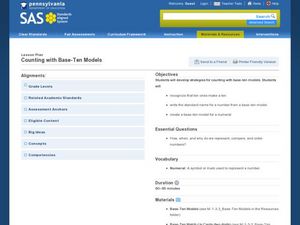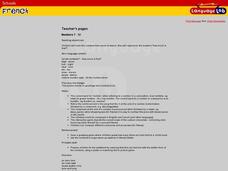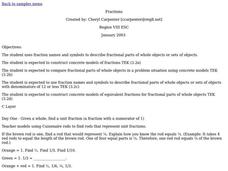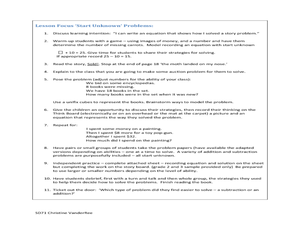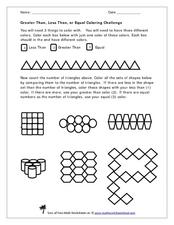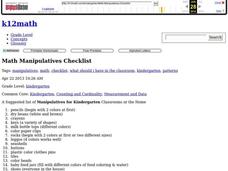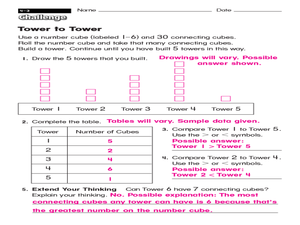Curated OER
Can You Name That Shape?
Learners use materials to build, investigate, and draw two-dimensional shapes (polygons). They combine the shapes they have built and draw from the pile to begin a round-robin activity to name and determine the attributes of a selection...
Curated OER
Counting with Base - Ten Models
Help your kids develop strategies for counting. For this base-ten lesson, learners use matching cards, base 10 blocks, and dry erase markers and boards to examine the base 10 counting system.
August House
Go to Sleep, Gecko
Use this multidisciplinary lesson to delve into these subjects: English language arts, math, science, drama, and character education. After reading, discussing, and making interpretations about Go To Sleep, Gecko!: A Balinese Folktale by...
media.yurisnight.net
Science Lesson Plan: Our Solar System: I Wonder?
Ever wonder why Pluto isn't considered a planet? Or how large the Earth is compared to the other inner planets? Explore the universe with a series of projects that simulate different aspects of our solar system. The activities require...
Learner
Solid Shapes
A collection of two lessons, kindergartners will identify two-dimensional shapes in solid shapes. They will develop basic knowledge of the components that make up a sphere, rectangular prism, pyramid, cylinder, cone, and cube. Young...
BBC
Counting in French: Numbers 7 - 12
Counting from seven to twelve in French is the foundational skill of a lesson from the BBC. Learners respond in French to the question, "How much is that?" (Ça fait combien?). The "Notes" and "Reinforcement" sections have inventive...
Curated OER
Understanding Fractions - Cookbook Comparisons
Learners explore equal fractions in relationship to a whole unit. They fold strips of paper into halves, thirds, etc. and compare them to the first strip which represents a "whole unit." Fractional parts are identified and compared.
Curated OER
Teddy Bears and Friends
Children begin by making direct comparisons between objects and putting a number of objects into order according to length. They are also introduced to measuring with multi-link cubes which allows them to compare objects which cannot be...
Curated OER
Fractions
Young mathematicians use fraction names and symbols to describe fractional parts of whole objects or sets of objects. They construct concrete models of fractions, and compare fractional parts of whole objects in a problem situation using...
Curated OER
Introduction to Equivalent Fractions
Explore equivalent fractions! Youngters measure the crown of their head with adding tape labeled with various fractions and fractional parts, and compare strips to notice numerical relationships. They fold adding tape in half and color...
Curated OER
Solve Story Problems: Sold! A Mathematics Adventure
Young mathematicians listen to the book Sold!: A Mathematics Adventure by Nathan Zimelman where they encounter ways to solve story problems. They then create and solve start unknown addition and subtraction equations. Resource builds in...
Curated OER
Measuring Beads
Students compare the weight of the students's favorite soft toys directly and then indirectly using beads.
Curated OER
Big Boats Up The River
Using boats along in the Port of Albany as the focus, learners practice adding single-digit numbers and interpreting data. This lesson plan comes with the worksheets, resource links, and other materials to make it a worthwhile experience.
Curated OER
Relations
Students identify, compare, and analyze shapes and numbers. For this analogies and comparison math lesson, students warm up by completing 4 worksheets to familiarize themselves with analogies. In small groups, students are challenged to...
Curated OER
Everyday Mathematics: Ballpark Estimates
In this estimating practice worksheet, students sharpen their math skills as they learn how to make likely estimates and try the 2 extra practice activities.
Curated OER
Flash Fractions 3
Love this! Kids play to practice determining which fraction is larger. Each set of fractions are represented in numeric form as well as how they appear on a fraction circle. This is a great way to show learners the differences between...
Curated OER
Garden Scavenger Hunt
Second graders examine the metric system. In this metric system lesson, 2nd graders compare measurements of common objects in metric units. Students compete in a garden scavenger hunt.
Curated OER
Greater Than, Less Than, or Equal Coloring Challenge
There are a few handy objectives to practice in this math worksheet. The big picture is that learners count a set of triangles and compare the number with six other sets of shapes. They indicate if each value is greater than, less than,...
Curated OER
Patterns
Explore early algebra by participating in a pattern identification activity using a random assortment of different household materials. The class creates, completes, and analyzes different patterns with the help of leggos, buttons,...
Curated OER
Counting Money and Making Change
Students count collections of coins and one-dollar bills. They solve problems and learn to use the dollar sign ($) with the decimal point to represent money amounts. This lesson is important as a foundation for future math concepts in...
Curated OER
Building Towers with Number Cubes
For this building towers with number cubes worksheet, 2nd graders build number cube towers by rolling a dice, then complete a data chart to compare the number of cubes in each tower.
Curated OER
Comparing Shamrock Numbers (E)
In this math worksheet, learners analyze and compare the three numbers in each of 6 shamrocks. Students circle the greatest number in each shamrock. Numbers are between 50 and 100.
Curated OER
Comparing Shamrock Numbers (G)
In this math worksheet, students analyze and compare the three numbers in each of 6 shamrocks. Students circle the greatest number in each shamrock. Numbers are between 50 and 100.
Curated OER
Comparing Shamrock Numbers (I)
In this math worksheet, students analyze and compare the three numbers in each of 6 shamrocks. Students circle the greatest number in each shamrock. Numbers are between 50 and 100.



